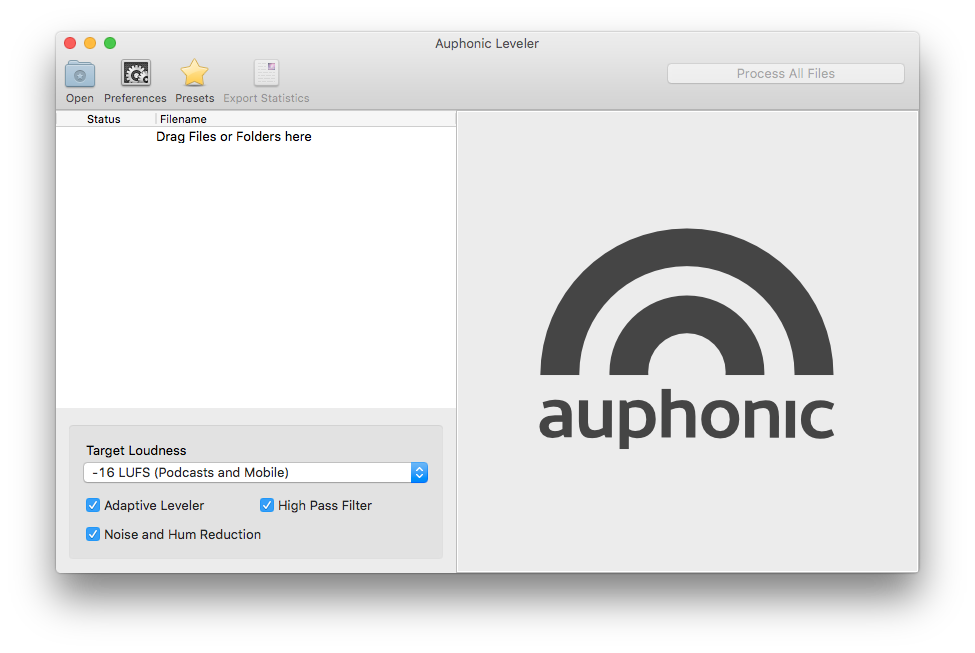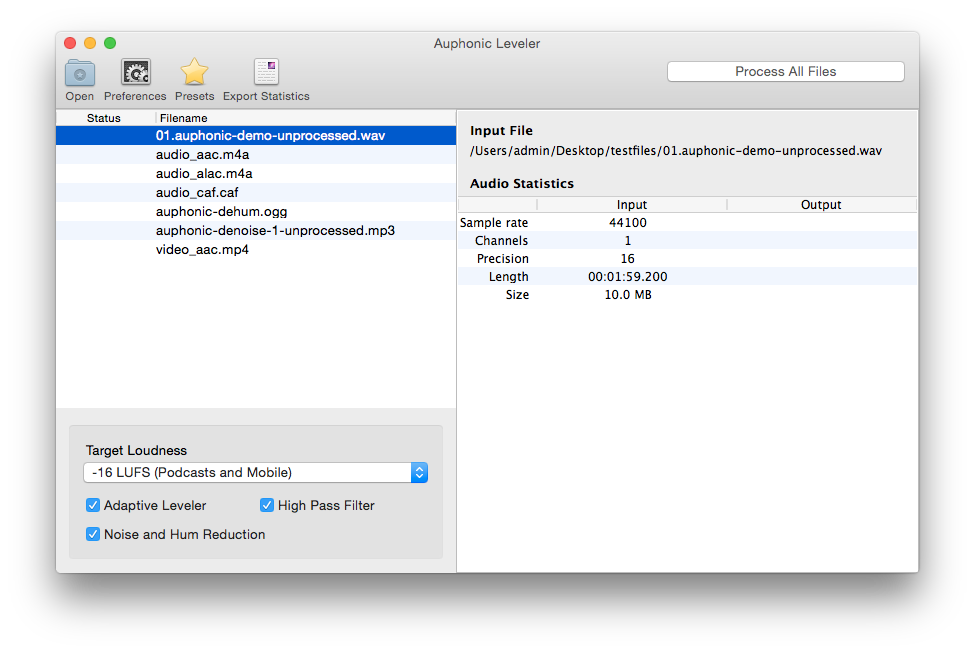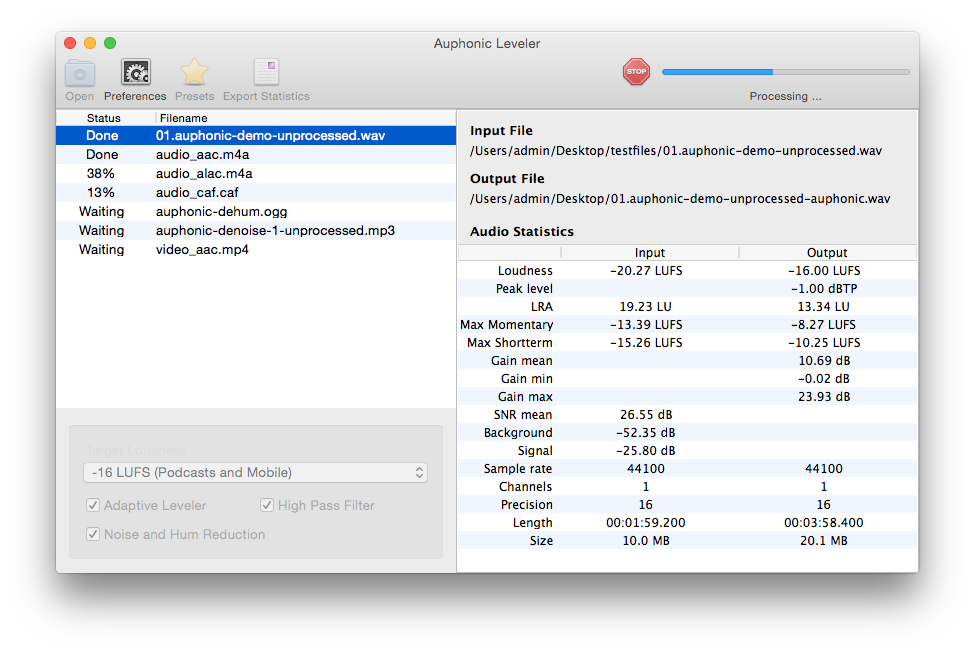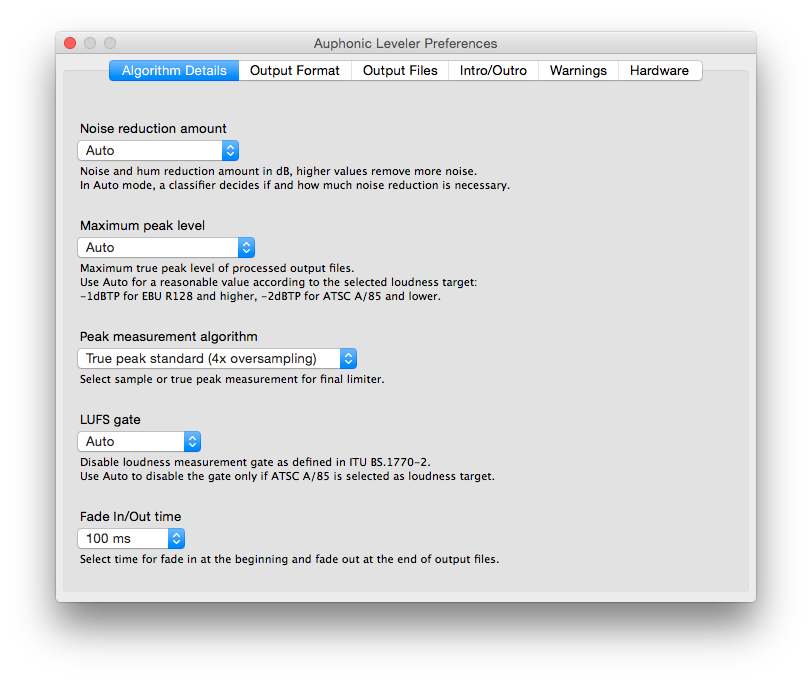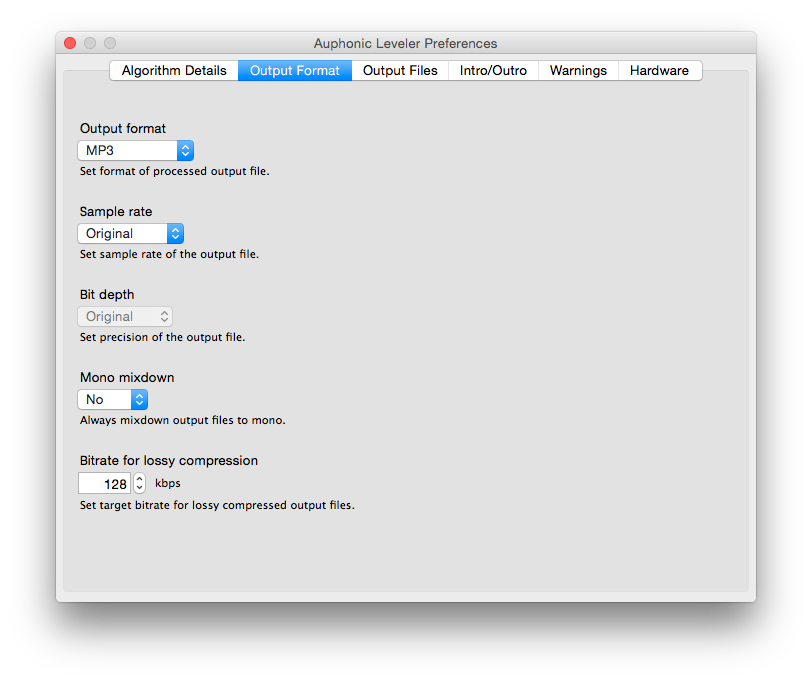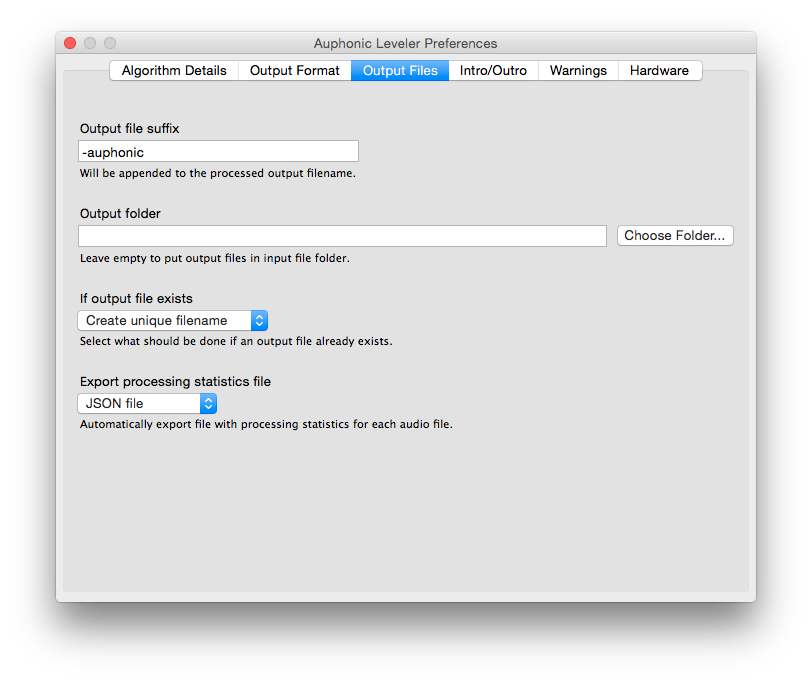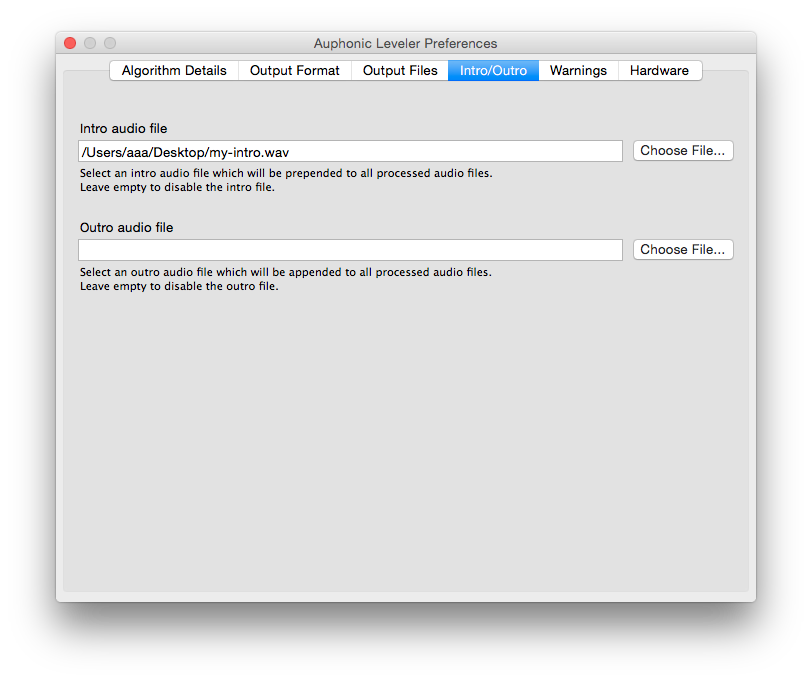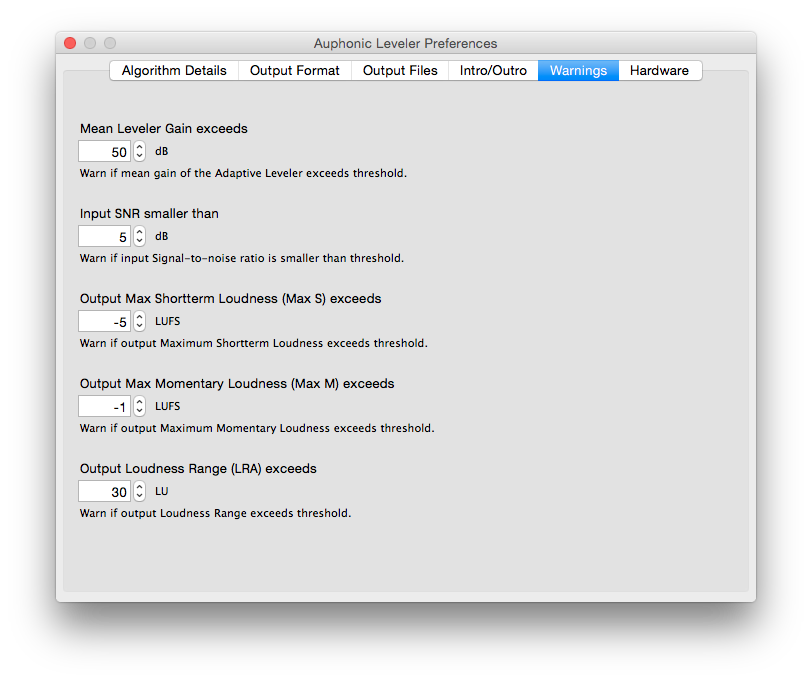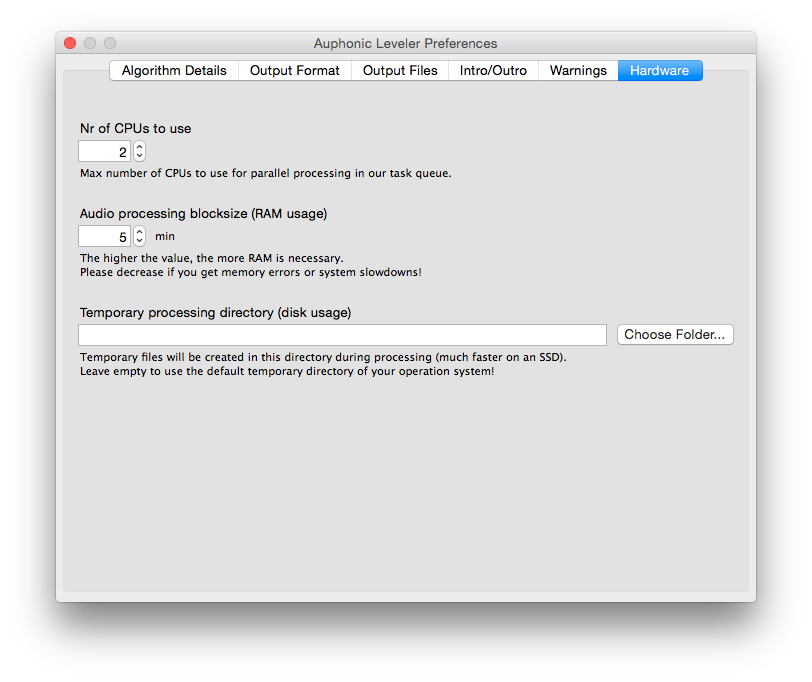Auphonic Leveler Batch Processor
The Auphonic Leveler is an intelligent Desktop Batch Audio File Processor
which analyzes your audio and corrects level differences between speakers,
between music and speech and between multiple audio files to achieve a
balanced overall loudness.
It includes a True Peak Limiter, targets for common
Loudness Standards (EBU R128, ATSC A/85, Podcasts, Mobile, etc.)
and automatic Noise and Hum Reduction algorithms.
Important:
The Auphonic Leveler does
not work on macOS >= Ventura anymore!
Most of our new algorithms use custom hardware, therefore it is unfortunately not possible for us to update the current desktop apps - please consider using our web service instead!
Features
Audio Algorithms
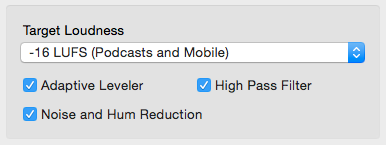 The following algorithms are included in the Auphonic Leveler Batch Processor:
The following algorithms are included in the Auphonic Leveler Batch Processor:
- Adaptive Leveler
-
Our Adaptive Leveler analyzes the content of audio files using machine learning techniques and is capable of balancing loudness variations between segments in one file:
- Music, background and speech segments are classified
- Loudness differences between speakers are corrected and dynamic range compression is applied
- Music segments are processed with care: the overall loudness will be comparable to speech, but the natural dynamics are not changed as in speech segments
- Background segments (noise, wind, breathing, silence etc.) won't be amplified
- Most suitable for programs, where dialogs/speech is the most prominent content: podcasts, radio, broadcast, lecture and conference recordings, film and videos, screencasts etc.
For more details and audio examples see Adaptive Leveler . - Loudness Normalization
-
Global Loudness Normalization calculates the loudness of your audio and
applies a constant gain to reach a defined target level, so that all
processed files have the same average loudness.
The loudness is calculated according to latest broadcast standards (ITU-R BS.1770)
and Auphonic supports loudness targets for television (EBU R128, ATSC A/85),
radio, podcasts, mobile and more.
For details and audio examples see Global Loudness Normalization . - True Peak Limiter
- A True Peak Limiter, with 4x oversampling to avoid intersample peaks, is used to limit the final output signal to the selected maximum true peak level and ensures compliance with the selected loudness target.
- Noise and Hum Reduction
-
Our Noise Reduction algorithms remove broadband background noise in audio files with slowly varying backgrounds.
First the audio file is segmented in regions with different background noise characteristics, then a noise print is extracted in each region
and removed from the audio signal.
In automatic mode, a classifier decides if and how much noise reduction
is necessary.
The Hum Reduction algorithms identify power line hum and all its partials. Afterwards the partials are removed as necessary with sharp filters.
For more details and audio examples see Noise Reduction. - High Pass Filter
-
An adaptive High Pass Filter cuts unnecessary and disturbing low frequencies,
depending on the context (speech, music or noise).
For more details see Adaptive Filtering .
Parallel Processing of Multiple Files and Presets
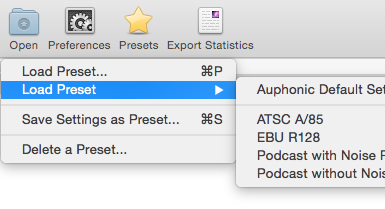
The Auphonic Leveler Batch Processor includes a
Parallel Task Queue with configurable CPU, RAM and disk usage.
Just drag and drop audio collections into the program window and
all files will be processed in parallel with your current settings.
During processing, the progress and status of all individual files and
the combined progress is shown in the application.
All your current settings (audio algorithm parameters,
output file options, intros/outros, warnings, hardware settings, etc.)
can be saved as Presets.
Processing Statistics and Warnings
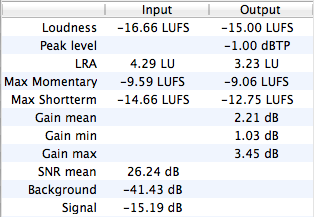
Audio Processing Statistics of input and output files
display details about what our algorithms are changing in your files.
They can be used to check compliance with
Loudness Standards
(Program Loudness, Maximum True Peak Level, LRA - see
EBU TECH 3341, Section 1
) and certain regulations for commercials (Max Momentary, Max Short-term Loudness - see Section 2.2).
It also shows how much our Adaptive Leveler changes your levels (Gain mean, min, max),
statistics about your input audio signals (SNR, Background and Signal Level) and much more.
Statistics can be exported as files (manually or automatically)
in machine readable JSON, in YAML, or in a human readable text format.
The exact file format is the same as in our
Web Service and is documented
here.
It is also possible to setup Warnings for quality control or as
alerts to manually check problematic segments in your audio:
for example, you don't want a MaxMomentary loudness >= -19 LUFS or
an Input SNR <= 15dB.
Warnings will be displayed in the application and are also exported
to processing statistics files.
Supported Input and Output File Formats
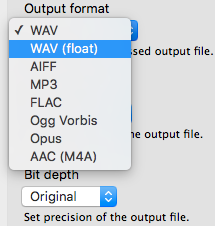 We support a wide range of input and a limited selection of output file formats.
Sample rate and bit depth conversions are using the high quality
resampling and dithering algorithms of
SoX.
We support a wide range of input and a limited selection of output file formats.
Sample rate and bit depth conversions are using the high quality
resampling and dithering algorithms of
SoX.
Please use lossless audio formats whenever possible.
- Supported Input File Formats:
-
WAV, WAV (float), AIFF, FLAC, MP3, Ogg Vorbis, Opus
Mac OS X only: MP4/M4A/M4B, AAC, ALAC, CAF, AC3, MP2, 3GP - Supported Output File Formats:
-
WAV, WAV (float), AIFF, MP3 (via lame), FLAC, Ogg Vorbis, Opus
Mac OS X only: AAC (M4A)
Screenshots and Help
Please see Auphonic Leveler Help for a descriptions of all available parameters and for further help.
Next Screenshot > < Previous ScreenshotNext Screenshot > < Previous Screenshot
Contact
In case of any problems or questions, please don't hesitate to contact us at
support@auphonic.com.
We also build custom versions of our programs and algorithms on request!
